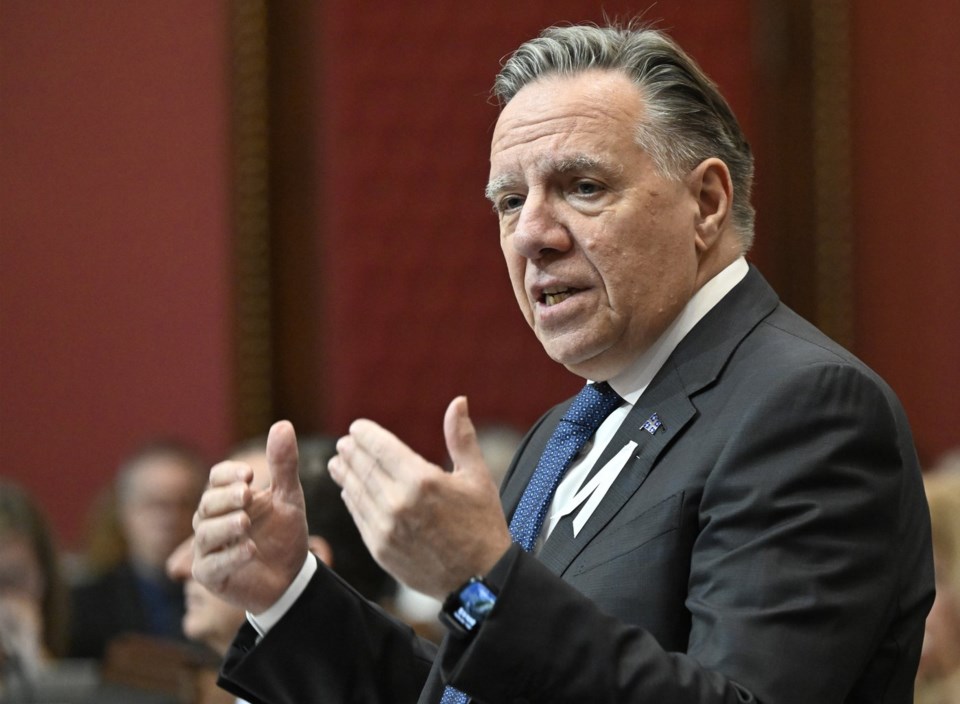MONTREAL — Quebec's Catholic bishops have come out against Premier François Legault's desire to end prayer in public places, saying it would violate people's constitutional rights.
Martin Laliberté, president of the assembly of Catholic bishops of Quebec, says he was "stunned" by Legault's recent suggestion that he would like to ban prayer in parks and on city streets. He believes a ban on public prayer would affect a wide range of activities practised by people of many faiths.
Legault raised the possibility of ending public prayer during a press conference Friday, which he began by saying he wanted to send a "very clear message to Islamists."
The Quebec government has promised to introduce new legislation to strengthen secularism in schools, following reports of Muslim prayer and other religious practices being permitted in Quebec public schools. When asked by a reporter if he is also bothered by prayer in public places, Legault said his government is looking at whether it can ban the practice. He said Quebec could use the notwithstanding clause to shield a ban from constitutional challenges.
On Tuesday, federal Immigration Minister Marc Miller accused Legault of picking on Muslims. "I think you have to respect people's right to religion," he told reporters in Ottawa. "It seems to me he's always blaming Muslims."
Images of Muslims praying in Montreal streets have sparked controversy in recent months. But members of other faiths also hold public events in Quebec, including the Way of the Cross procession led by the Catholic archbishop of Montreal on Good Friday.
Miller referred to the Christian pilgrims who climb the stairs of St. Joseph's Oratory in Montreal on their knees. "Would that be banned? I don't know," he said. He also called it "ironic" that Legault attended the reopening of the Notre Dame Cathedral in Paris on Saturday, the day after he told reporters that Quebec needs to be more secular.
Earlier in the day, the assembly of Catholic bishops published an open letter saying a ban would target minority religious groups that are perceived by some as threatening Quebec's identity. They said freedom of religion is protected under the Canadian and Quebec charters of rights and freedoms, and a ban on public prayer would be unenforceable.
Laliberté, bishop of the diocese of Trois-Rivières, Que., said in an interview that his congregation will sometimes hold picnics in the park in front of the cathedral. "If we pray before the meal, are we going to be suspect?" he asked. "Are we going to be breaking the law because we're praying? What is a prayer?"
Daniel Baril, president of the Mouvement laïque québécois, a group that promotes secularism, said Legault's comments took everyone by surprise, "like a rabbit pulled out of a hat." He said he would need to see details of the plan before forming an opinion.
Baril said his group does not object to public religious events like the Good Friday procession, which he said are planned in advance and receive permits. But he doesn't support "spontaneous" events that block streets or take over parks. He pointed to an instance last June when members of Montreal's Muslim community gathered in a city park to celebrate Eid al-Adha. The event prompted the borough mayor to muse about banning all religious events in public parks.
"Those public spaces must remain accessible to everyone," Baril said.
But Laliberté pointed out that people often go to parks to practise yoga or tai chi, which both have spiritual roots. "So is the person practising a religious act or just a physical activity?" he said. "It's a slippery slope toward the disrespect of the fundamental rights of individuals."
This report by The Canadian Press was first published Dec. 10, 2024.
— With files from Michel Saba in Ottawa
Maura Forrest, The Canadian Press



